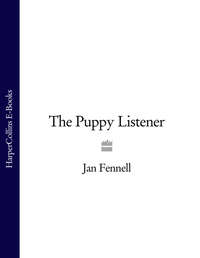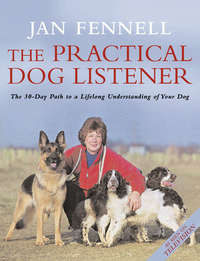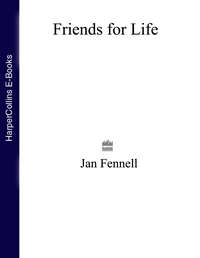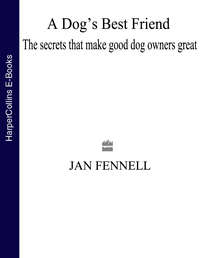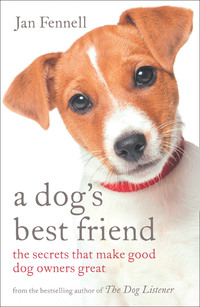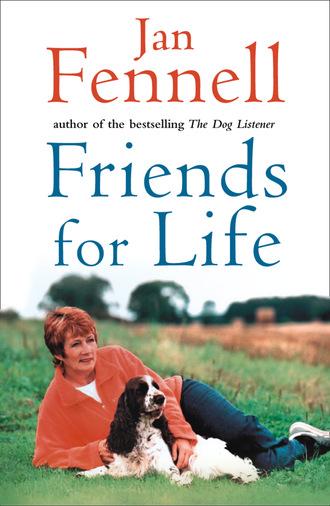
Полная версия
Friends for Life
Sometimes I called her Lady, more often than not I simply referred to her as My Little Dog. She used to appear whenever I felt hurt or lonely. As my childhood progressed, that meant she was an almost constant companion.
With my mum and dad it was always as if the world revolved around the two of them. I was filled with a sense that I somehow didn’t fit into their plans – or indeed anyone else’s.
We’d go to places then I’d be left sitting in a corner, with nobody to talk to. On holiday my mum would begin suggesting she and my dad should go off somewhere or other then say: ‘Oh we can’t, we’ve got Janice.’ They’d always want me out from under their feet. I was a nuisance because I stopped their fun. I was always made to feel I was in the way.
Even within the family I felt left out. I had cousins, but because my dad was the second youngest of his brothers and sisters, they were all much older than me. I can remember watching them and envying the way they played with each other. It always seemed that there was no one for me, I was always the person on the outside looking in. Whenever there was a family do, my mum and dad would be together, my cousins would be together and I would be on the sidelines.
My mother’s only interest in me lay in dressing me up.
Mum thought she wanted a child but what she really wanted, I believe, was a doll. She kitted me out in frilly, patterned dresses and fussed endlessly over my hair. I’m sure it pleased my mother that I was always being admired for my clothes or my hair; I had beautiful, tumbling ringlets. But to me it was a source of sadness that I was always admired for something else, never for myself.
So, from an early age, I had no choice but to make friendships elsewhere.
We used to spend a lot of time with my father’s brother George. He had a dog called Rex, a lovely, gentle creature. Back in those days nobody had pedigrees, they had mutts. Rex was a mutt, a mixture of all sorts of influences. He was black and tan in colour, not very big; he had a curly tail, long pointy ears and a slightly foxy look. He probably had some German shepherd in him. But he was a hugely affectionate dog, and he loved directing that affection towards me.
He’d always make a beeline for me and fuss over me. I can recall how, whenever I arrived at their house on the edge of west London near Heathrow, Uncle George would say: ‘Oh Rex, your friend’s here.’ Then, while the rest of the family were talking about their important lives, I’d sit stroking him or playing ball. It didn’t stop me feeling something of an outsider within the family. But it did stop me feeling so lonely.
If my passion for animals had a source, it was inherited from my father’s side of the family. My father liked animals himself. He had owned a dog called Gyp when he was younger and had worked with horses before the war. He used to say that he missed the old horse that pulled the cart on his bread round as a young lad in the 1930s. It had been replaced by a lorry. ‘No matter how hard I whistled it wouldn’t come to me like my old horse,’ he would joke.
But it was my grandmother and my Great-Uncle Jim Fennell who really made an impression.
My paternal grandmother, Mary Ann Till, was a remarkable woman. She had grown up as part of a traditional travelling Romany family in the latter stages of the nineteenth century. Although she had said goodbye to that life a long time ago, she still wore a traditional Romany cap and smoked a pipe. She always seemed to have a cup of black, piping hot tea cradled in her hands. I can recall sitting on her knee listening to the tales she told of what, even then, seemed like a lost age.
Her parents toured the country making and selling lace and working as knife and blade makers. It was a seasonal life. The men spent the winter looking after the horses and making blades and the women made lace. Then when the spring came they would tour the stately homes of England.
The image of the wandering gypsy has always annoyed me. My grandmother recalls a life where they were welcomed by the well-to-do ladies of the manor, who would buy the lace while her father worked on all the knives and scythes.
Animals played an important part in their life. Horses and dogs were crucial members of the family business and were treated with respect. In fact, horses played their part in bringing my grandparents together.
When my great-grandparents died, the family wagon was burned according to the ceremonial traditions of the Romany nation. My grandmother and her sister were allowed to keep some of the family’s possessions. But they themselves were passed on to another family for adoption. The sisters were deeply unhappy with their new family and kept running away. They never made it very far and were returned to the new family, where each time they were treated worse than before. Eventually their shoes were taken away from them to prevent them from breaking away again.
I didn’t know my grandmother’s sister very well, but I know my grandmother was a determined character. It was the middle of winter when they made their final, successful break for freedom. They found themselves outside London, in Middlesex, but they didn’t know precisely where. They just ran, barefoot, carrying their few possessions bundled up. A blizzard was blowing and they were close to collapse when they stumbled across a horse-drawn cart on a pathway. Two young men, wrapped up in big coats, were driving the horse home through the snows. One of them shouted: ‘Come on, girls, get up here.’ The two men were my grandad, George Fennell and his brother, my Great-Uncle Jim. The pair ran a fruit and vegetable delivery business and had been out on their rounds when they were caught in the snow themselves. They were making sure the horse was looked after.
George and Jim took the two girls home to their parents; it turned out they had been lost in Hammersmith, then a village outside London. The girls stayed, and they and the brothers were eventually married.
My grandfather’s family had an equally great respect for animals. My gran used to tell me a funny story about him. He had pulled up outside a pub, The Redan in Grafton Road, at the end of a working day. There were several horses and carts outside. My grandfather walked into the pub. Going up to one of the men at the bar, he asked him: ‘Are you enjoying your beer?’
The man had hardly said yes when my grandad punched him in the face. ‘Go on, put a coat on your horse,’ he said. ‘You look after your horse first.’
They tended to hit first and ask questions afterwards back then. But the man hadn’t put a coat and nosebag on his horse. My grandad was right – the animals were their livelihood.
Like many Romany women, Nan Fennell had the ability to foresee the future. She didn’t always regard it as a positive attribute. Whenever anyone told her she had a wonderful gift she’d always say: ‘It can be, but it can also be a terrible curse.’
It was easy to see why. Her family had suffered more than its fair share of tragedy. She foresaw the deaths of two children. The first was Uncle George’s youngest, Ellen, the baby. Her older brother, the eldest of the grandchildren, was Johnny. When Ellen was born she was taken up to see my nan, who held Ellen in her arms for only a few moments before asking: ‘Where’s Johnny?’ She was in a real state. ‘Just get me Johnny.’ When Johnny appeared, she said to him: ‘We love you, and we always will, no matter what happens in your life.’ The year after Nan died, Ellen was run over in a freak accident. Johnny was at the wheel of the lorry when it happened.
She foresaw tragedy again when her youngest son, Bill, and his wife Elsie had a son. When the baby boy, Trevor, was put in her arms all she said was: ‘You love this baby, you make the most of this baby.’ At the age of three the baby fell into the River Mole at Walton in Surrey and drowned.
On both occasions, people recalled my grandmother’s words after the tragedies occurred. She didn’t spell out what she had seen. Her philosophy was that you tell someone good news but you don’t tell them bad. She had a happy knack of being able to tell her daughters and daughters-in-law that they were expecting babies – sometimes weeks before they’d even conceived. But on other occasions my father would just say: ‘She’s seen something.’ She would see things then that would upset her deeply.
While I sat on my grandmother’s lap, she would often tell me things. For instance, when I was six she predicted that I would have two children. ‘But there will be more,’ she said obliquely. It would be many years before that made any sense.
If Nan Fennell was a powerful force within the family, so too was my grandfather’s brother, Jim, by far the most colourful of the clan. I remember vividly the day I finally summoned the courage to ask him about the awful lump he had on the back of his neck. How could I ever forget the story he told me?
As a thirteen-year-old boy growing up in Fulham at the end of the nineteenth century, Jim had headed off to see Buffalo Bill Cody’s great Wild West show at Earls Court in 1896. He was so overwhelmed by what he saw that he went home that evening and promptly announced he was joining the show and heading off on their European tour.
He was the little boy who ran off with the circus – and a memorable time he had too. His experience working with horses stood him in good stead and he was put in charge of Buffalo Bill’s stable.
Great-Uncle Jim was the family’s natural performer, however, and he soon persuaded Buffalo Bill to give him a place in the show. While driving the famous Deadwood Stagecoach around the arena one night he was hit on the back of the neck by an Indian tomahawk. The blow was accidental but it split his neck wide open. ‘That’s where the hatchet hit me,’ he told me.
It was Jim who introduced me to the first important animal in my life, his horse Kitty. Kitty was a typical Thelwell pony, as wide as she was tall, black with a long mane, her tail trailing down to the ground.
Great-Uncle Jim kept her in stables in Battersea Park, where he also kept the cart from which he sold his fruit and vegetables. I vividly remember Great-Uncle Jim placing me on her back and feeling the warmth and softness underneath me. Together we spent hours padding around Battersea on his horse and trap, talking about his adventures – and his love of horses.
Great-Uncle Jim had learned a lot from the native Americans he had worked with during his time with Buffalo Bill. He remembered one of them coming up to one of the horses one day before a performance, looking at it and saying: ‘That horse is lame.’ The cowboy who was due to ride the horse wasn’t having any of it. ‘To my shame I got the horse ready and let it go out into the arena. When it came back it broke down,’ Uncle Jim told me. ‘Bill Cody asked, “Didn’t anybody spot it?”’ Great-Uncle Jim said: ‘He did,’ and pointed to the native American.
Great-Uncle Jim had a huge respect for the quiet courage of those men. He disliked intensely the way they were presented as the ‘baddies’ in Buffalo Bill’s show, in which the white men were always being rescued from the redskins. But from the stories he had heard the native Americans tell of their time back in the West, he wondered who needed rescuing from whom.
In that sense he was the first person who made me think about injustice. He gave me another important idea too.
His relationship with Kitty was almost telepathic. I remember Great-Uncle Jim used to be able to lay down the reins, put his arm around me and whisper a gentle, ‘Take us home, Kit.’ In London in those days there was hardly any traffic. Kitty would take her time going home at her own pace.
At the stables where he kept Kitty he would sit me on her, bareback, and tell me how important it was to become one with the horse, to become part of it. He didn’t like the way ‘the nobs’, as he called them, used to ride, with a saddle and a whip. He would say: ‘You must breathe at the same rate as it. Until you can take in every breath that it takes you’ve got nothing.’ Again this was something he had picked up during his time with the native American horsemen.
Looking back on it now, I realize it was Great-Uncle Jim and Kitty who first instilled in me the idea of animals and humans working in harmony. As a little girl I saw them working together instinctively, as a team. There was no coercion, they understood each other perfectly. It seemed like the most natural thing in the world.
Chapter 3
A Secret Happiness
In 1951, as a three-year-old, my mum and dad took me to the Festival of Britain celebrations, just across the river in Battersea Park. The images of that day are burned indelibly into my memory.
I was too young to understand the wave of optimism the Festival had inspired. But I do vividly remember the sheer joy of the occasion. I remember my father and Uncle Fred were both wearing white shirts. In the sunshine they seemed dazzling – just like everything else in the park.
Battersea Park was filled with people. I recall the carousels and the candy floss, the sounds of the hurdy-gurdies and the fairground hucksters inviting people to ‘Roll up, roll up’. But the thing that created the greatest impression was the little grey-white pony that was giving children rides in a special arena.
I immediately asked my parents for a ride. But, just as quickly, my mother made her opposition plain.
‘You don’t want to go on that nasty smelly thing,’ she said. I was dressed in a smart new plaid dress, I remember. ‘You don’t want to ruin your nice dress.’
It was my Uncle Fred who conspired to help me. My mother wandered off at some point. I remember Uncle Fred bending down, beckoning to me and whispering. ‘Come on, come on. Now’s your chance,’ he said.
I ran over to the pony arena with him. Before I knew it I was being lifted on board the beautiful grey-white pony.
I’d yet to meet Uncle Jim’s Kitty so this was the first time I’d sat on a horse. I can still remember the pungent smell. It was lovely then and remains so to this day. Forget your Chanel No. 5. As I was led around the arena on horseback I remember feeling on top of the world. I felt like a princess, it was so special. I would have stayed there all day.
One of the attendants led the pony round in a slow circuit of the arena. As he took me back to where I’d started I saw my time was up. I could see my dad and Uncle Fred with big beaming smiles but behind them was my mother with a face like thunder.
‘I thought I said she couldn’t, Wal,’ she snapped at my father as I was led away from the arena a few moments later. ‘What’s the point of putting her in nice clothes if they’re going to smell of filthy animals?’
The incident confirmed something that was already becoming clear to me. There was a clear hierarchy in our house. And I was at the bottom of the pecking order.
My parents’ attitude to children was a throwback to the Victorian era in many ways. I should be seen and not heard. My opinion wasn’t of any importance to anyone. All that mattered, to my mother at least, was that I present a happy, polite, smiling face to the world. Unless, that is, she wanted to show off my singing and dancing abilities at a family gathering. Even then, the only words I got from her were chastisement if I hadn’t done something to the standard she expected.
At the time this upset me deeply, but I no longer feel that way. I understand now that she was merely reflecting the values passed on to her. She and my father were trying to provide a better life for me than they had enjoyed themselves. But it was as if they had had me out of a sense of duty, and then resented the duty that came with it.
There was no doubt they gave me the best they could afford. They bought me lots of toys, for instance. But then they would spoil it by not allowing me to play with them because they got in the way and messed up my mum’s house. I was only allowed to play with one toy at a time.
There was no point arguing about things like this. I was expected to accept that they did things for my own good. If I ever upset the apple cart, they’d say: ‘After all I’ve done for you …’ And if I protested too much, my mother was very quick to smack.
If I was at the bottom of the pecking order at home, my mother was very much at the top.
My father would literally wait on her hand and foot. He would say that he was so lucky to have her, he would do anything for her. He would protect her from being upset, even if it meant hiding the truth.
If anybody said anything she didn’t like or upset her, the waterworks would start and she would just cry. He couldn’t cope with that, he’d fall to pieces. Of course if I tried a similar tactic, it didn’t work. They would tell me: ‘We’ll give you something to cry for.’
So when I started showing an interest in animals, I sensed there would be problems from the beginning. Mum didn’t like me being near them, it was as simple as that. To her it was more important that I look immaculate and well turned out. And animals didn’t fit in with that.
As I have said, my mother’s feelings always came first. She always got her own way. But she was asking too much in this instance. And fortunately there were members of the family who were willing to conspire with me.
It was my grandmothers who best understood the closeness of the bonds I was forming with animals.
The family had a number of dogs and by the time I was five or six I had formed a mutual admiration society with all of them. Wherever I went a dog would appear. My cousin Doreen, to whom I was very close, had a smashing dog called Tinker. He was ever so playful, a lovely long-coated creature, and I would spend endless hours playing with him. As a family we used to go on camping weekends to Walton in the Mole Valley. I recall there was a dog called Bunty in the tent next to our regular spot. My job was to go and get water from the standpipe but I always ended up playing with Bunty, a big shaggy dog like a mop. Playing with Bunty was the highlight of the weekend for me.
Nan Fennell knew how lonely and unhappy I was at home and encouraged me to cherish these new friendships. I will never forget what she said to me once. ‘They are a part of your life that is magic, that is special,’ she told me. ‘No one can spoil that. When you have the love and trust of an animal, nobody can ever spoil it. That is your secret happiness.’
She also defended my love of animals in the face of my mother’s hostility. Whenever my mother had a go at me in her presence she used to say: ‘She’s got a love of animals. It’s in her and it always will be, you can’t change that.’
But it was my mother’s mother who did most to conspire with me. Nan Whitton, as I knew her, lived nearby. She was a lady, in the very real sense of that word. She came from landed gentry in Northamptonshire but had become estranged from her family, the Thorneycrofts, after marrying a sailor named Edward Whitton. The family thought he was ‘beneath her’ and made no secret of it. Tragically he’d died during the flu epidemic of 1922 and she’d been left to fend for herself with four children. It was a tough life, yet despite the hardships she’d remained a dignified, gentle woman. I never once heard her swear or even lose her temper.
She had a real air about her. She was six foot tall and always immaculately turned out. She’d always dress up, even to go to the shops, putting on matching accessories and carrying an umbrella with a bow. Whenever I went out walking with her I’d see workmen doffing their caps to her as if she were a member of the aristocracy. She’d return the compliment with a gracious nod.
At home she’d spend hours doing embroidery and reading – something not many of my family did. I can also remember painstakingly polishing her silver with her.
This may well have been where my mother got her airs and graces from. But whatever their roots, Nan Whitton knew her daughter’s moods better than anyone, so she provided me with a source of affection that was a real life-saver at times. ‘I’m always here for a cuddle,’ she’d say. And she saw how fond I was of her cat, Smokey.
Smokey, bless him, was the ugliest cat you’ve ever seen. His head was lop-sided. He was a big black moggy. Yet that cat was so affectionate. He had a purr like a traction engine. I lay on the landing looking at Smokey one day. Nan was in the kitchen. I said to her: ‘Why do you love Smokey?’ I was confused because my mum used to tell me you could only be loved if you were beautiful, that ugly didn’t get loved.
My nan looked out of the kitchen and said: ‘Only me and his mother could love him.’ To her the fact that he was ugly didn’t matter. To her ‘beautiful is as beautiful does’. It was a thought that would have been lost on my mother. But it made a big impression on me. Mum didn’t like me playing with Smokey, of course. I’d try like mad to brush the hairs off but as soon as I took one step into the flat she’d say: ‘You’ve been near that cat again.’
So Nan Whitton taught me to carry two cardigans with me. I always used to have a little bucket bag in which I put a spare cardigan. I used to wear one while I was with the dogs or cats then change over. I would take the cardigan covered in hairs around to Nan Whitton. She must have been a magician, because somehow she always got the hairs off.
And it was she who helped me spend time with Digger, the first dog I really considered my own.
Digger belonged to our friends Peggy and Eddie, who lived in East Molesey. He was a little sandy-coloured Cairn terrier, a great little dog, hardy and a lot of fun. He and I got on like a house on fire. Whenever I went there, he was as pleased to see me as I was to see him. He would be up on his hind legs. He was my boy. He was there for me. Every time I looked at him or spoke to him his tail wagged.
With Digger, as with all the dogs I met at the time, I felt there were no conditions, I could be myself rather than the person that other people wanted me to be. He didn’t make me feel as if I was in the way.
I was so fond of Digger that I went to great lengths to orchestrate time with him.
Once I feigned sleep in order to stay the night at the house rather than go back to Fulham. I lay on a sofa with my eyes closed and heard my dad saying: ‘She’s exhausted.’
My mum said he should carry me out to the car. Finally Peggy said: ‘Oh, let her sleep here the night, we’ll run her back tomorrow.’
I thought: ‘Yes.’ Isn’t that pathetic?
I had to go along with the charade now and it was very odd lying there as my dad carried me up to a strange bedroom. Of course, as soon as the house was quiet I slipped down to give my canine pal a cuddle and I was up at the crack of dawn the next morning playing with him.
It was during a summer holiday that Nan Whitton helped me to effectively adopt Digger. Uncle Eddie used to work in Munster Road in Fulham where he had a workshop. Every day I went round to collect Digger from him, then took him to my nan’s house. Of course my mother knew nothing about this. It only lasted a few weeks but I still look back on it as a great time.
My secret friendship with Digger taught me much. Being with him seemed to change the world around me. Confined within my mother’s world no one spoke to me. Out walking Digger that summer I found people stopping for no apparent reason and talking away to me. I saw that dogs were great icebreakers.
I can remember how people used to tell me stories about their dogs. I could see the happiness they brought into their lives. By the end of the holiday, my nan and I had our own favourite memories of our time with Digger; we nicknamed him Digger Doughnut because of his love of the buns we’d slip under the tables of cafeterias we visited together during that long summer.
It only strengthened my determination to form more lasting friendships like this.
My mum had her secrets too, hidden parts of her life that only increased the distance between us. It was while we were out shopping one day around this time that I got a glimpse of a darker and more dangerous aspect to her life.


